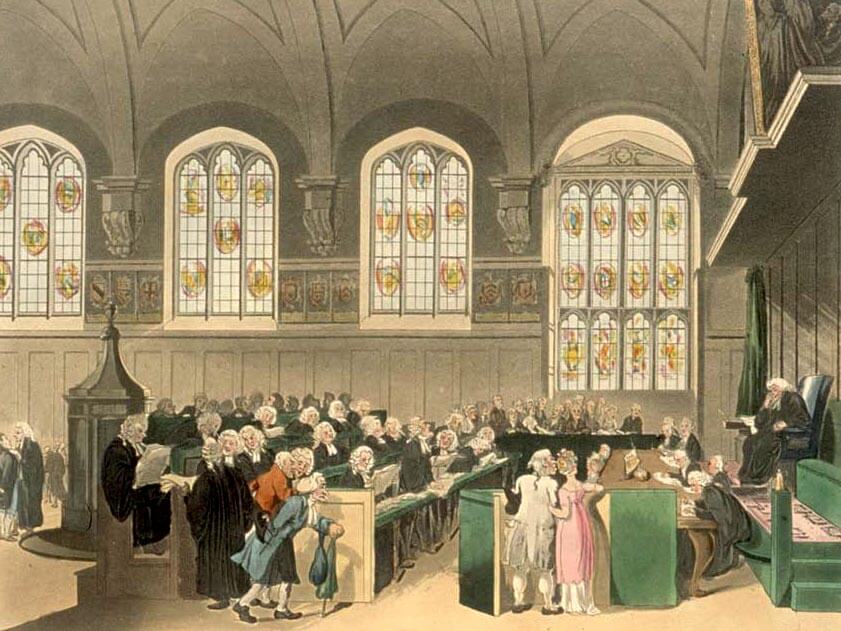Learn about the history and meaning of Chancery, how it’s used in modern English, and see examples of how to use the word in a sentence.

Definition of Chancery
Chancery refers to a court of equity that is responsible for administering justice based on principles of fairness and natural justice. Historically, chancery was a separate court system in England and Wales that operated alongside the common law courts. The chancery courts were responsible for resolving disputes that were not covered by common law, such as those involving trusts, wills, property rights, and contracts that required specific performance. The chancery courts were known for their flexible and innovative approach to resolving disputes and their ability to provide equitable remedies, such as injunctions and specific performance orders, that were not available in the common law courts. Today, the chancery jurisdiction has been largely incorporated into the High Court of Justice in England and Wales, although some chancery courts still exist in other common law jurisdictions.
How is “Chancery” used in English? What are the rules of use of “Chancery”?
In modern English, “Chancery” is primarily used to refer to the historical court system in England and Wales that administered justice based on principles of equity and natural justice. It can also refer to the specific court building in London where the Lord Chancellor traditionally had his or her office.
In terms of usage, “Chancery” is typically capitalized when used to refer to the historical court system or the specific court building in London. For example:
- The Chancery Court was responsible for administering justice based on principles of equity and natural justice.
- The documents were filed with the Chancery Clerk’s Office in the Chancery Building in London.
When used more generally to refer to a court of equity or a court that administers justice based on principles of fairness and natural justice, “chancery” is usually not capitalized. For example:
- The probate court is sometimes referred to as a chancery court because it handles matters involving trusts and estates.
- The judge in a chancery court has the power to issue injunctions and other equitable remedies.
Overall, the rules of use of “Chancery” depend on the specific context in which it is being used and whether it is being used to refer to the historical court system, the specific court building in London, or a court of equity more generally.
How to use the word Chancery in a sentence?
Here are 20 sample sentences using the word “Chancery”:
- The case was heard in the Chancery Court because it involved complex issues of trust law.
- The Lord Chancellor’s office was located in the historic Chancery Building in London.
- The Chancery Clerk’s Office is responsible for maintaining records of court proceedings.
- The Chancery Court has the power to issue injunctions to prevent someone from taking certain actions.
- The Chancery Division of the High Court deals with a wide range of legal matters, including intellectual property disputes.
- The Chancery Writ is a legal document that initiates proceedings in the Chancery Court.
- The Chancery Judge has the power to grant specific performance orders to enforce the terms of a contract.
- The Chancery Master is responsible for managing the administrative aspects of court proceedings.
- The Chancery Bar Association represents lawyers who practice in the Chancery Division of the High Court.
- The Chancery Court has a long and distinguished history in English legal tradition.
- The Chancery Building is an iconic landmark in the legal district of London.
- The Chancery Court played an important role in the development of equity and natural justice.
- The Chancery Clerk can provide information on court procedures and filing requirements.
- The Chancery Judge may appoint a receiver to manage the assets of a bankrupt company.
- The Chancery Court has the power to set aside fraudulent transactions involving trusts or estates.
- The Chancery Writ is a formal document that sets out the nature of the claim being brought to the court.
- The Chancery Division has specialist judges who are highly experienced in complex legal matters.
- The Chancery Court is known for its flexible approach to resolving disputes.
- The Chancery Master can make orders for costs and provide directions for the conduct of proceedings.
- The Chancery Bar is a highly specialized area of legal practice that requires extensive knowledge of trust and property law.